Homeless Tent City Is a Democracy
It’s actually several communities, and all are civil, orderly and well-run.
There are a lot of stories in Tent City, a homeless encampment that sprawls across five acres under the I-794 freeway west of 6th Street between West Clybourn and West St. Paul Avenues. More often than not, bad luck and bad decisions bring people here. A middle-aged lady lost her apartment because she took on too many boarders. Several middle-aged men traveled here for jobs that did not materialize. An older man with terminal cancer came to Wisconsin to go fishing and die. He and his girlfriend took a train from California and soon ran out of money when their plans to stay with family fell through. It takes just one mishap for veterans and people fresh out of jail who lack the resources or family that provide the rest of society with a safety net to end up homeless.
Many of the encampment’s dwellers have a plan to get back on their feet and some have the tools to do it such as cellphones, driver licenses, food stamps and healthcare. Some are on the list for Section 8 housing which provides federal assistance to millions of low income households for rent and utilities. Some of the denizens of Tent City have jobs, like a married woman who gets up at 6:30 a.m. to catch a bus to her job at Taco Bell in Oak Creek; a one-and-a-half hour trip each way.
Tent City is also centrally located to important services and amenities that serve the homeless. Showers and laundry services can be accessed a mile away at the Milwaukee Recuse Mission. Free wi-fi is available one block north at the Central Branch of the Milwaukee Public Library—an important resource for people who need to access online forms and information about subsidized housing, jobs and healthcare. Many homeless people from Tent City use the wi-fi across the street at the Intermodal Station.
The residents benefit from the kindness of strangers who drop off food and water and even occasionally bring grills and barbecue. Businesses in the neighborhood chip in. Most of the tents have been donated. There are cases of bottled water everywhere. No one seems to be hungry in Tent City thanks in large part to the work of StreetLife Communities and Street Angels, two local non-profits that help the homeless and a man everyone fondly calls Pastor Dave, described as “a good guy who really helps out.”
The expanse of the campsite gives the citizens of Tent City long views of people coming and going, which provides a modicum of security while the freeway overhead provides shelter from the hot sun and rain. The place is orderly and clean with an emphasis on good sanitation practices.
I say “citizens” because Tent City is a loose association of democratic neighborhoods; five clusters of tents spread out across the landscape like frontier towns. Each community has its own leaders, turf, rules and governing principles including a process to admit and expel members. They keep an eye on each other’s stuff and mete out a sort of informal justice that generally resolves most conflicts. When that fails, the police are called and “are nice” according to residents. Like more formalized communities, these create an orderly existence, mostly through self-policing, customs of civility, and camaraderie.
Each group thinks theirs is more exclusive than the others. The self-declared “quiet group” that occupies the south ridge overlooking the Menomonee River Valley points to the “tough guys” up the hill.
So I went up the hill and talked to the so-called “tough guys”. They offered me a chair, as one would do for a guest in your living room. So I sat down and chatted with the group—all refugees from the Milwaukee Rescue Mission.
Why did they leave?
A chorus broke out. “Freedom!”
“If you don’t believe in God you are screwed, you are going to hell,” one guy said, and everyone nodded. “Catholics don’t get to go to heaven!” he added.
At the Rescue Mission, I’m told, attendance at religious services is mandatory as is wake-up and out of bed at 5:45 a.m. A 6:30 p.m. curfew made it impossible for one man to work overtime at the print shop where he is employed, leaving him with only two choices; forfeit the money that would eventually allow him to rent a place to live, or move out of the Rescue Mission.
Many described the humiliation of oppressive rules and favoritism. The residents of Tent City have made a choice—they prefer the freedom, autonomy and community of their “village” to their previous institutional setting. (When asked about this, the Rescue Mission’s president Patrick Vanderburgh said the wake-up time is actually 5:15 a.m. and confirmed the nighttime curfew and mandatory daily attendance at a religious service. As for the rules and philosophy of the mission he said many residents find it a “sweetly communal place,” but conceded “it’s not for everyone.”)
A few days after I went to Tent City I noticed a third row was filling up in the “tough guys” camp site. Tent City is growing.
And becoming a growing problem for the image of the city. Tent City makes homelessness visible in Milwaukee. A fact that has inspired the spontaneous generosity of a lot of businesses and individuals in Milwaukee and raised the ire some business leaders in town.
“No human being should have to live under these conditions, period,” Beth Weirick, CEO of Milwaukee Downtown Business District #21 told the Milwaukee Journal Sentinel. “For us to continue to allow people to live this way, I believe, is inhumane.” She described the place as “increasingly squalid, unsanitary and dangerous.”
That’s not what I encountered, which made me wonder about news accounts portraying the camp as being at a “crisis stage”. As I got up to leave, one of the men thanked me. “Of all the people who’ve come here—social workers and reporters—you’re the only person who sat in a chair,” he said. “Everyone else just squats, like our chairs are dirty.”
All photo by Tom Bamberger
If you think stories like this are important, become a member of Urban Milwaukee and help support real, independent journalism. Plus you get some cool added benefits.
More about the Tent City
- Eyes on Milwaukee: Officials Celebrate Tent City Replacement - Jeramey Jannene - Sep 28th, 2021
- Eyes on Milwaukee: Is There A Plan To Prevent New Tent City? - Jeramey Jannene - Jan 8th, 2020
- Green Project at ‘Tent City’ Site Finalized - Graham Kilmer - Dec 20th, 2019
- Eyes on Milwaukee: Will Tent City Come Back? - Jeramey Jannene - Dec 4th, 2019
- City Creating Green Project Under I-794 - Graham Kilmer - Nov 27th, 2019
- Open house Tuesday on joint stormwater project under I-794 - City of Milwaukee Deptartment of Public Works - Nov 22nd, 2019
- How You Can Help the Homeless - Bridget Fogarty - Nov 21st, 2019
- Tent City Homeless Evicted By State - Alana Watson - Nov 21st, 2019
- MKE County: Officials Relocating Tent City Residents - Graham Kilmer - Oct 28th, 2019
- Plats and Parcels: Tent City Being Evicted - Jeramey Jannene - Oct 6th, 2019
Read more about Tent City here
In Public
-
The Good Mural
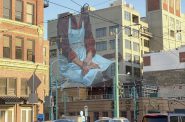 Apr 19th, 2020 by Tom Bamberger
Apr 19th, 2020 by Tom Bamberger
-
Scooters Are the Future
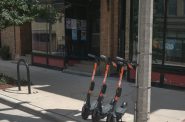 Dec 19th, 2019 by Tom Bamberger
Dec 19th, 2019 by Tom Bamberger
-
The Lost Legacy of Harry Weese
 Apr 22nd, 2019 by Tom Bamberger
Apr 22nd, 2019 by Tom Bamberger


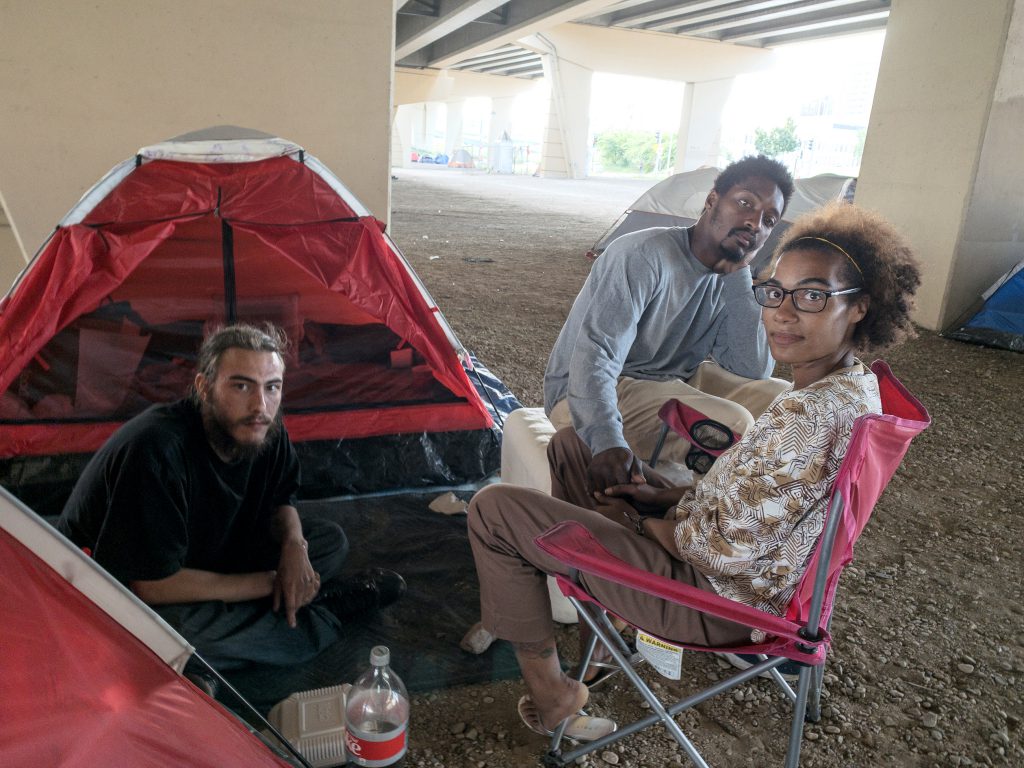
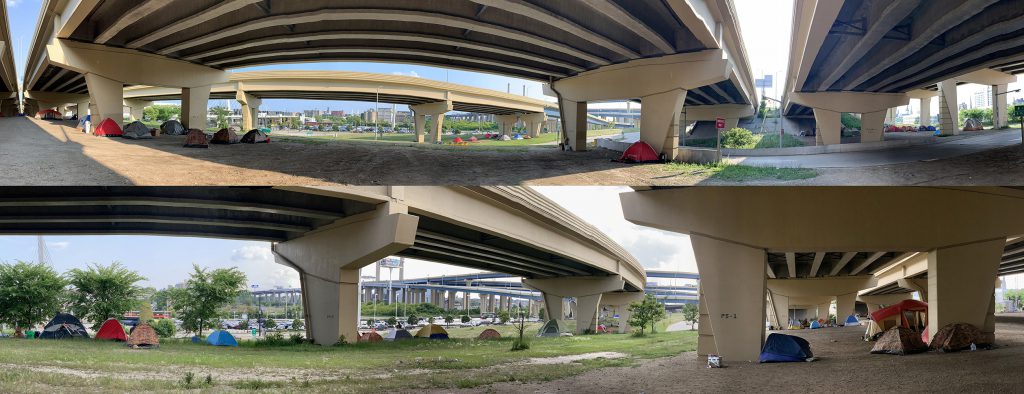
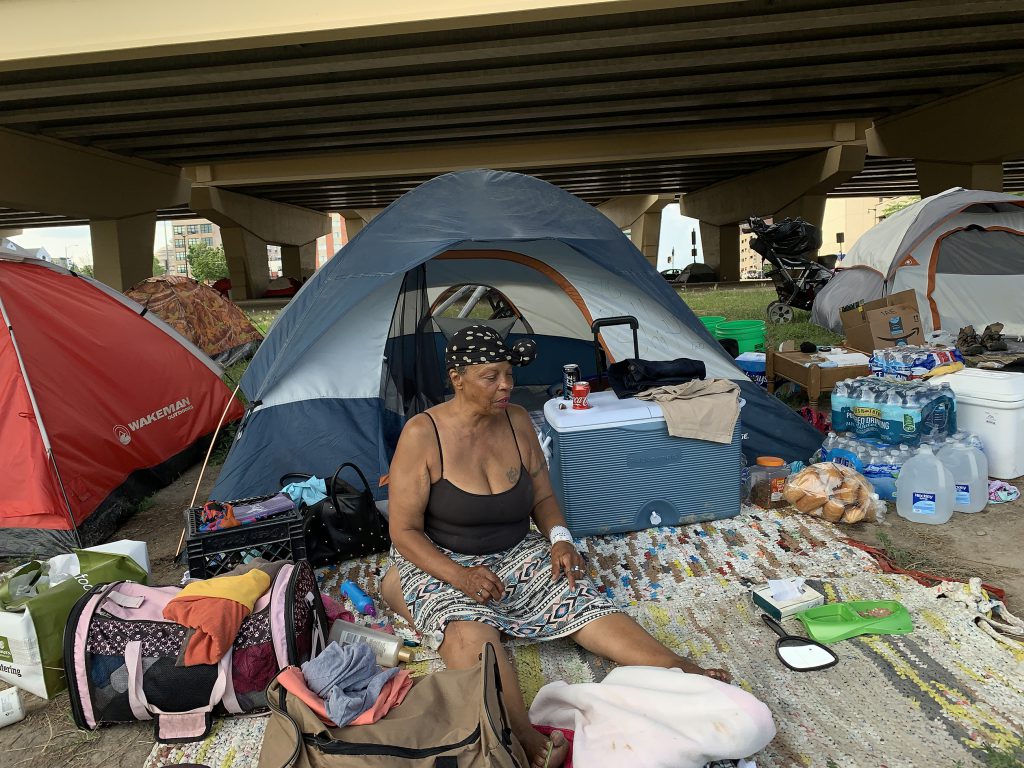
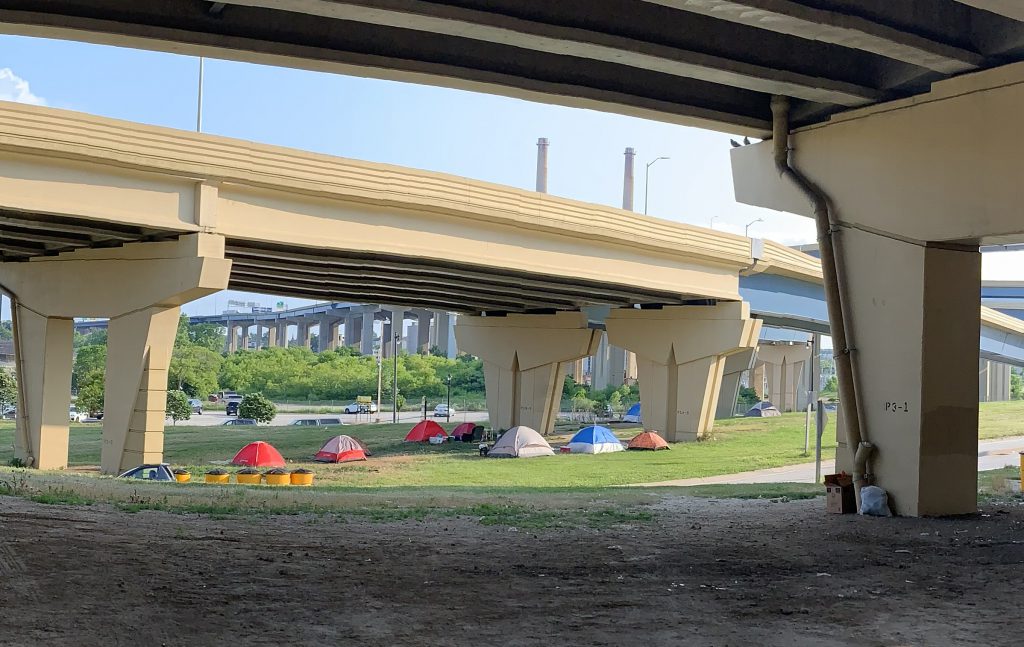
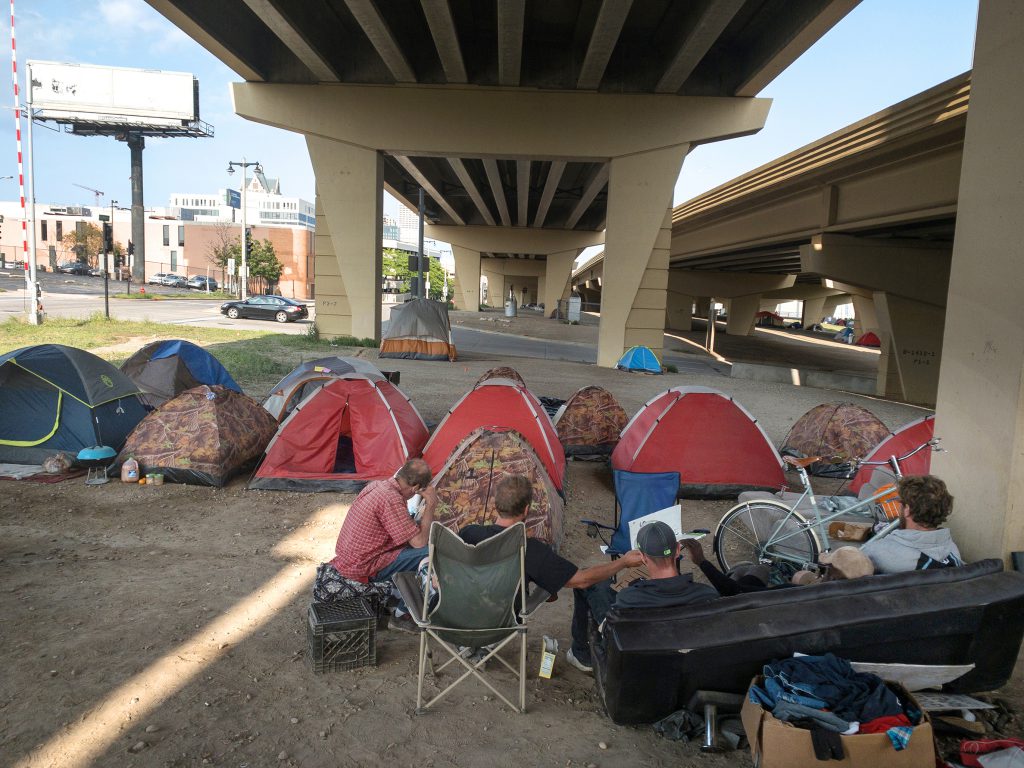
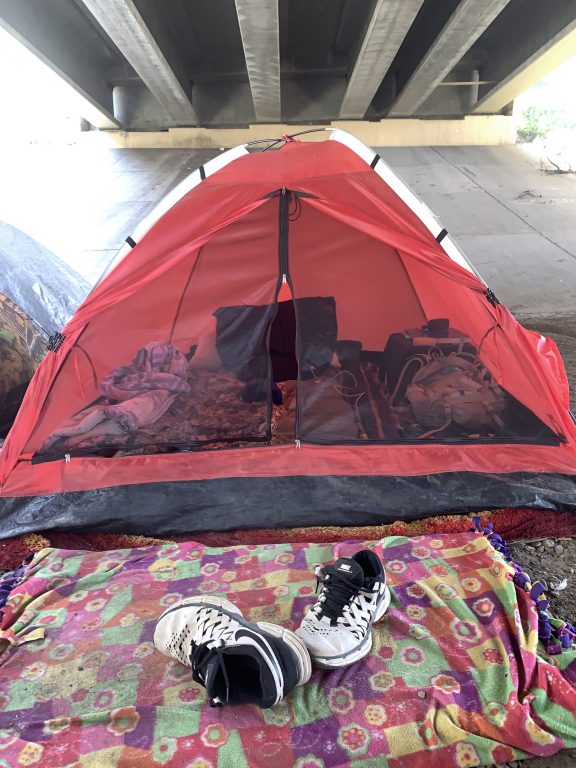


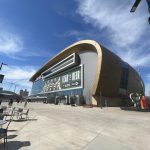















Your article paints a very rosy picture of tent city, leaving out any mention of substance abuse, addictions, mental illness, brain damage and physical wear. And I wonder how long Milwaukeeans will be willing to tolerate or support the free-life so relished by those you interviewed. Most would agree that the goal is to help these people reach as much functionality and self-sufficiency as they can handle, and I don’t see how allowing them to continue living under a bridge leads to this.
Also, if you want to visit another tent city, check out the one behind the King Park community center. They are the source of all the alcohol bottles you see on the park grounds.
To sbaldwin001’s comment: It doesn’t sound like a rosy picture to me. These people are living outside under a freeway. That it is not a a total hellhole is a good thing. Yes, many of these people are homeless precisely because of substance abuse, addictions, mental illness, brain damage and physical wear. But if we aren’t to allow them to live in a tent city with some services and police supervison, then what? Homelessness as you well know is a big problem. If you have a better solution to generosity of the surrounding area, and some spontaneous organizing on the part of the homeless themselves, then let’s hear it. Where can they be dispersed to that will not make their lives even worse?
Re: Gregg Mulry, August 3, 2019:
There are places where they can go. I understand their reticence regarding the Milwaukee Rescue Mission, but it does provide food and shelter. If they object to the religion, they can leave in the morning at 5:30 a.m., and they can sit respectfully in the back of the chapel when they return at 6:00 p.m. in the evening. The religious service lasts only about an hour after which they shower and sleep. For the men, the Guest House and Hope House also provide food and shelter. I am less familiar with the alternatives for women.
Food and shelter are the easy part. The hard part is connecting the homeless with funding or employment that will allow them to live as much on their own as they are capable. All the shelters have case workers, but each time a resident moves, which is often a house requirement after 5 weeks, they start all over with a new case worker at their new location.
A single, long-term case worker for each case would go a long way toward solving problems rather than shuffling them from place to place. I would rather see funding go through them than directly to the homeless as is happening at the tent city. Public or private; donations, philanthropy or taxes – take your pick, but it will cost money to sort through through the mix of problems and connect people to solutions. Dealing with those who need treatment but do not wish to be treated will require the most judgement.
For those who simply want freedom without responsibility, I am not sympathetic.
This sounds wonderful to me , the options can be very oppressive , controlling, domineering in a way that simple is inhuman . Can we not focus on what is ? this is a beautiful story about people helping people what in many lives is a very rich place” to be ” ” to serve” ” to serve the greater good ” .” lift the capacity of other ” and it looks very efficient . Those that demonize this might consider looking in the mirror first .
well done insightful reporting , such an uplifting place to come from , the photographs tell the stories of “what is” versus mans inclination to illuminate “what is not ” I am proud of our community for being so inclusive , respectful and transparent . Who can say they have superior knowledge in such complex situations . There are people in our community that have voluntarily been serving this community for years , very neat folks that make this a much better world who know they are not the Maker of this universe . I am thankful I did not fall into such a set of circumstances that caused these organized folks to be in one of the tent cities lets give all mentioned credit for the respect and empathy they have for this part of our community .